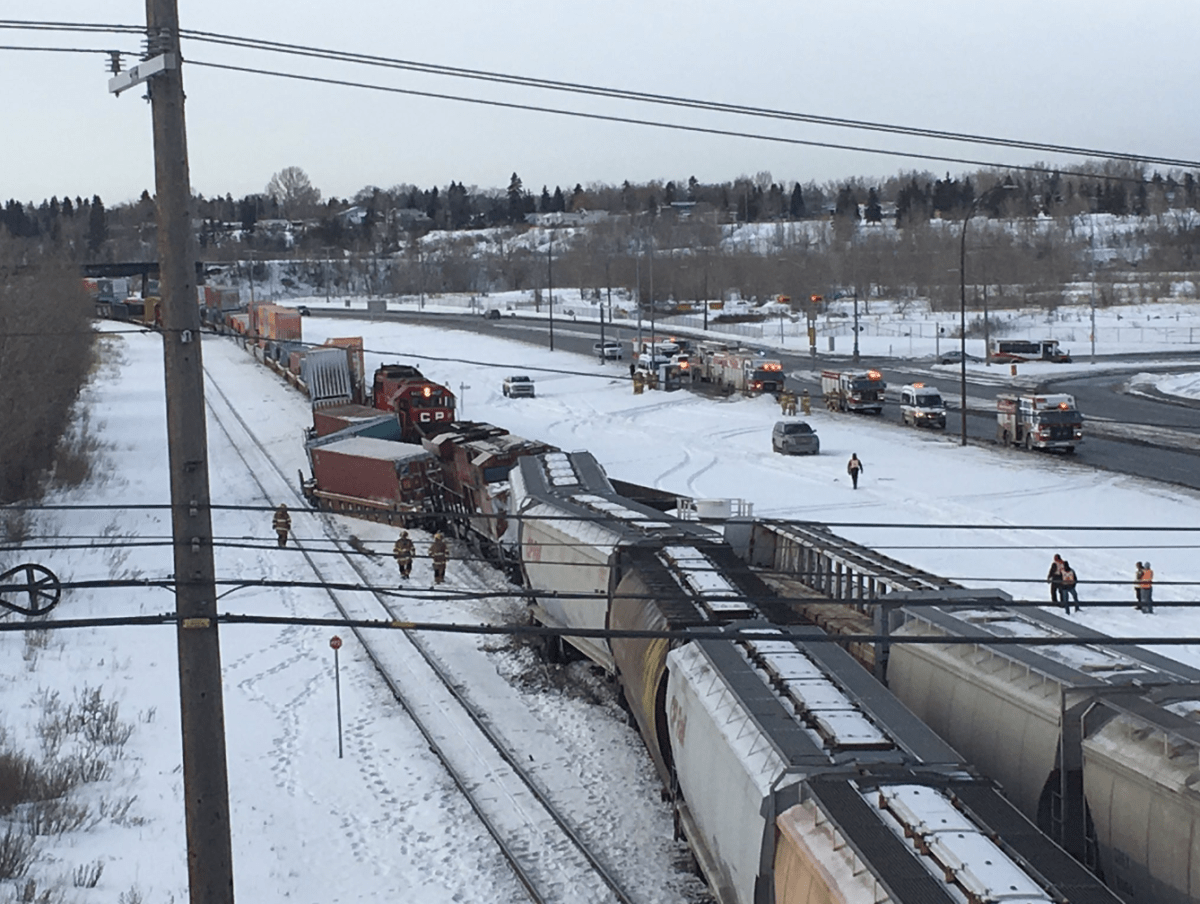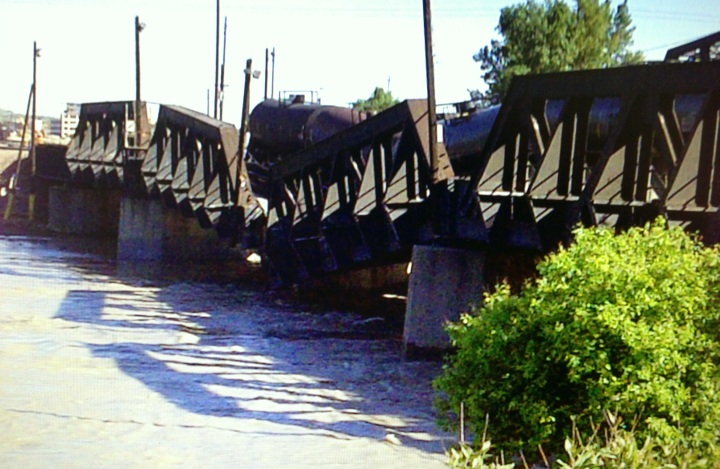Wednesday evening, a train derailed in a southeast Calgary rail yard, causing seven cars and two locomotives to derail and thousands of litres of diesel fuel to spill.

There were no injuries and Alberta Environment and Parks confirmed that the spilled fuel had “not impacts” to area waterways or storm sewers.
But it’s not the first time there has been a derailment at the Alyth rail yard.
Alyth yard is CP’s largest rail facility in Calgary, and typically handles chemical and energy commodities.
According to a CP Rail map, Calgary’s Alyth yard connects with lines north to Wetaskiwin and Edmonton, south to Lethbridge and Coutts, west to Golden and Vancouver, B.C, and east past Medicine Hat.

Wednesday’s derailment and spill at Alyth is not currently being investigated by the Transportation Safety Board (TSB), but it is collecting information.
Here’s a look back at some of the major rail incidents that have been investigated by the TSB at or near the Alyth rail yard in Calgary in the past decade.
Derailing collisions
On March 9, 2019, two CP Rail crew members were using a remote control system for a switching assignment south of the Alyth yard when that train collided with another.
That collision caused 12 cars and two locomotives to derail. There were no injuries or spills reported.
On the morning of Jan. 6, 2019, 56 cars disconnected from a chain of cars being switched and ran uncontrolled down a main track into an emergency track that had stationary, loaded cars.
No injuries were reported, but 22 cars were derailed and a “small amount” of fertilizer pellets were spilled and recovered. The TSB said the fertilizer was not regulated and posed no threat to the environment.
The final report found a connection knuckle had developed fatigue cracking due to overstress and failed.

Get daily National news
“The fatigue crack was likely present during the last detailed inspection, two months prior to the occurrence, but was not identified,” the TSB report said.
On Nov. 8, 2018, 80 CP Rail cars rolled a quarter of a kilometre uncontrolled through the Alyth yard, but did not cause any derailments or injuries, nor were there any dangerous goods on board.
On Sept. 3, 2016, two trains collided when one was stopped at Alyth and spanned the 50th Avenue overpass. The second train ran into the first and three cars derailed, resulting in no dangerous goods being spilled and no injuries.

The TSB investigation found the second train came around a curve towards Alyth at too high a speed and was unable to stop in time.
The TSB report said CP reduced track speeds in the area and reinstalled centralized traffic control.
Operator fatigue and switching equipment
On the morning of Feb. 18, 2016, 13 cars were derailed during a switching operation along a curved part of the track.
The TSB said the combination of operator fatigue and operator error resulted in the derailing that saw no injuries nor spilling of dangerous goods.
On Sept. 11, 2013, a train departing Alyth for Red Deer had a wheel hit and climb a switch point, resulting in seven tank cars loaded with natural gas condensate being derailed. The derailment also destroyed 600 feet of track and severed a natural gas line.
The TSB found the switch point had degraded following wheel impacts and, over time, created a ramp.
The TSB said CP made improvements to its track infrastructure, including removing those switch points, upgrading the rails and installing a new turnout.
Bridge derailment
Just after 3 a.m. on June 27, a CP train headed for Medicine Hat and ultimately St. Paul, MN, derailed on the Bonnybrook Bridge over the Bow River, causing six cars to leave their tracks.
Four of the cars were carrying petroleum products and one car had ethylene glycol residue in it, but there were no spills and no injuries as a result of the derailment.
A TSB investigation found that “intense and unprecedented” flooding contributed to the bridge failure and derailment.
“Despite numerous vigilant and beyond regulatory inspections of the bridge, one of the four piers which support it experienced scouring on the bottom of the pier that was underwater,” spokesperson Mark Seland said at the time.
The bridge was dismantled and replaced.
CP Rail did not respond to request comment by publishing time.
- Two men charged after attempted violent kidnapping in downtown Calgary
- Calgary family living in a car calls for more resources for unhoused families
- Immigration, medical assistance in dying on agenda as Alberta legislature resumes
- 2 Jasper hockey players killed in crash with semi on way home to Hinton











Comments
Want to discuss? Please read our Commenting Policy first.